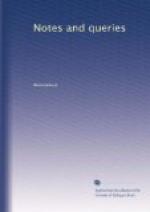Wither’s Mistresse of Philarete, Sig. E. 5. Ed. 1633.
On l. 27. (G.):—
“But yet, whate’er he do or
can devise,
Disguised glory shineth in his eyes.”
Sylvester’s Du Bartas.
On l. 46. (G.):—
“An eastern wind commix’d
with noisome airs,
Shall blast the plants and the
young sapplings.”
Span. Trag. Old Plays, vol. iii. p. 222.
On l. 65. (G.) Compare Drunmond—speech of Endymion before Charles:—
“To tell by me, their herald, coming
things,
And what each Fate to her stern distaff
sings,” &c.
On l. 84. (M.):—
“And with his beams enamel’d every greene.”
Fairfax’s Tasso, b. i. st. 35.
On l. 97. (G.):—
“Those brooks with lilies bravely deck’t.”
Drayton, 1447.
On l. 106. (G.):—
“Pan entertains, this coming night,
His paramour, the Syrinx bright.”
Fletcher’s Faithful Shepherdess, Act i.
J.F.M.
* * * * *
DERIVATION OF EASTER.
Southey, in his Book of the Church, derives our word Easter from a Saxon source:—
“The worship,” he says, “of the goddess Eostre or Eastre, which may probably be traced to the Astarte of the Phoenicians, is retained among us in the word Easter; her annual festival having been superseded by that sacred day.”
Should he not rather have given a British origin to the name of our Christian holy day? Southey acknowledges that the “heathenism which the {116} Saxons introduced, bears no [very little?] affinity either to that of the Britons or the Romans;” yet it is certain that the Britons worshipped Baal and Ashtaroth, a relic of whose worship appears to be still retained in Cornwall to this day. The Druids, as Southey tells us, “made the people pass through the fire in honour of Baal.” But the festival in honour of Baal appears to have been in the autumn: for
“They made the people,” he informs us, “at the beginning of winter, extinguish all their fires on one day and kindle them again from the sacred fire of the Druids, which would make the house fortunate for the ensuing year; and, if any man came who had not paid his yearly dues, [Easter offerings, &c., date back as far as this!] they refused to give him a spark, neither durst any of his neighbours relieve him, nor might he himself procure fire by any other means, so that he and his family were deprived of it till he had discharged the uttermost of his debt.”
The Druidical fires kindled in the spring of the year, on the other hand, would appear to be those in honour of Ashtaroth, or Astarte, from whom the British Christians may naturally enough have derived the name of Easter for their corresponding season. We might go even further than this, and say that the young ladies who are reported still to take the chief part in keeping up the Druidical festivities in Cornwall, very happily represent the ancient Estal (or Vestal) virgins.




